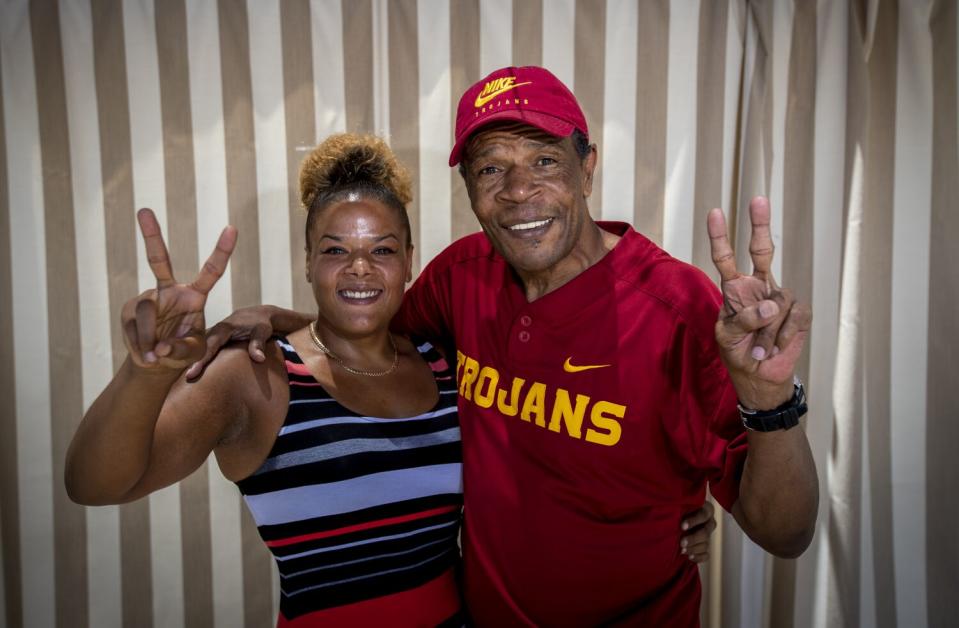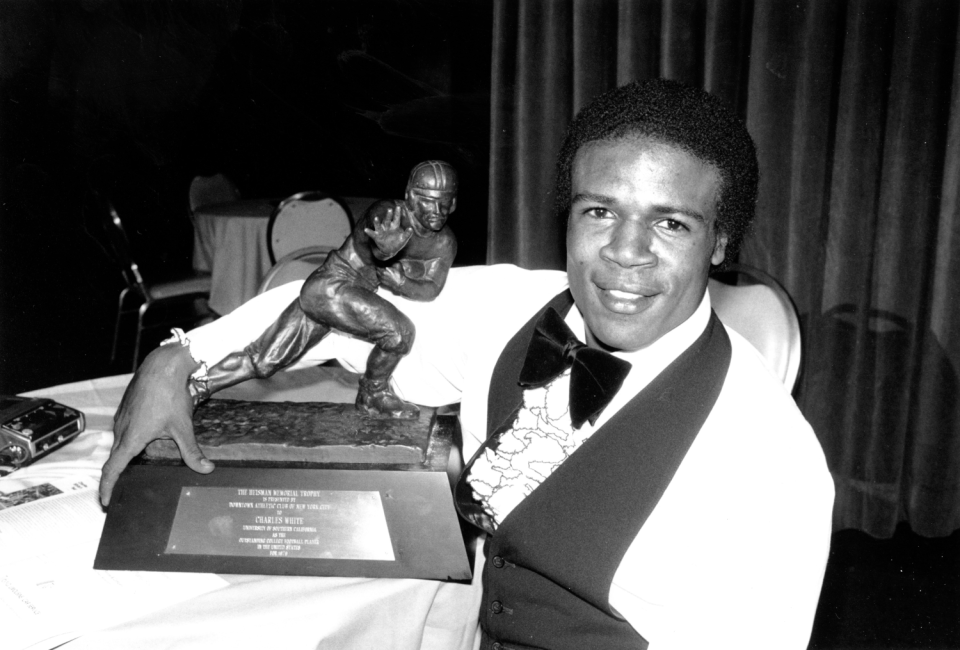Plaschke: 'He was a Trojan until his dying breath.' How Charles White reconnected with USC

- Oops!Something went wrong.Please try again later.
Nurses removed his USC jersey, unclasped his USC watch, slipped off his USC shoes.
Charles White seemingly was ending his tumultuous 64-year journey through life with no visible connection to the school that was his soul.
But as the Trojans’ Heisman Trophy winner was taking his last breaths in a Newport Beach hospital, his ex-wife and his daughter pulled out a phone.
One of the last senses to leave the body at the end of life is hearing, and they wanted him to hear how much he had accomplished, how much he had impacted, how much he was loved.
They carefully nestled the phone on the pillow next to his ear and played “Conquest!”
When Charles White expired on Jan. 11 at 3:21 p.m., he did so while accompanied by the USC marching band, its familiar strains sending him off to fight on through eternity.
“Go now,” his ex-wife, Judi White-Basch, whispered through the music. “Run free.”
He broke tackles until the end. He was forever a Trojan. He was forever Charles White.
The final weeks in the life of USC’s most prolific running back were a compelling testament to a man who turned a troubled life into triumph.
The college football star who flattened defenders while rushing for the most yards in USC history battled the horrors of esophageal cancer without a word of complaint.
“He had to be in agony but he never showed it, never talked about it, never even grimaced,” White-Basch said. “Until his last breath, he was a true Trojan.”
The human steamroller who spent his last few years suffering from dementia likely caused by a traumatic brain injury summoned his faculties to honor one of his successors.
“We were watching the Heisman Trophy ceremony and he pointed to the TV and said one word,” White-Basch recalled. “He said, ‘Caleb.’”
A key member on the 1978 USC national championship team who had been estranged from the school for several years because of a drug addiction was reunited with the Trojans when the school arranged for him to be treated by the physicians from Keck Medicine of USC.
“Our doctors understand the power of the Trojan family,” athletic director Mike Bohn said.
It is a power that not only coursed through Charles White in life, but also carried him home in death.
This wasn’t the ending anyone expected.
Last summer this column featured the tale of White’s decline into dementia and his solitary existence in a Laguna Beach assisted living facility. He seemingly had been forgotten by all but his closest family members. USC had not spoken to him in years. He wandered the halls wearing Trojans gear and loving a school that seemingly no longer loved him back.
But then in October he fell ill, and USC showed up, and his devotion to the Trojans grew even stronger, and in the end, White was back in the cardinal-and-gold huddle, filled with forgiveness, resting in peace.
“Forget about his legend on the field, how he handled himself in his last days was something I didn’t think was humanly possible,” White-Basch said. “No pain, no fear, no boundaries, pure love.”
The day before his death, he was wearing a USC jersey and USC sweatpants tucked under a USC blanket.
Hours before his death, Keck doctors were at his side and Bohn was texting his family.
Minutes before his death, White-Basch and daughter Tara stood in front of his bed, flashing the Trojans' trademark two fingers, rocking back and forth in tears.
“He was a Trojan until his dying breath,” White-Basch said. “And that was the literal truth.”
A public memorial service will be held Feb. 11 at 11 a.m. at Saddleback Church in Lake Forest. His remains are being cremated with the ashes to be kept in a USC-adorned urn.
Bohn said the school plans to honor White during a game next season. He is the first of their record eight Heisman Trophy winners to die. A CW jersey patch might be nice.
“We’re going to honor him in the fall when fans can join the salute,” Bohn said. “Charles was a great Trojan who left us too soon, and we’ll make sure his legacy and contributions on and off the field will be remembered forever.”

The greatest contribution from White actually might occur after his death. The White family arranged for his brain to be donated to Boston University’s Chronic Traumatic Encephalopathy Center for study. CTE is a degenerative, progressive brain disease that has been diagnosed in former football players who were subject to repeated hits to the head.
The family believes CTE could have led to White’s drug addiction and ensuing dementia. They cringe at the idea that the very thing that so endeared White to Trojans fans — his willingness to run over people — could have been the thing that eventually caused the school to divorce him.
“It all makes sense that the brain injury led to everything else,” White-Basch said. “We just want everyone to know the truth.”
After a historic four-year career at USC, White spent nine years absorbing hits in the NFL for the Cleveland Browns and the Rams. Since his death, his family has watched his highlight videos with a tinge of sadness.
“Instead of seeing every big hit and going, ‘Yeah, that’s great!,’ you’re like, 'Oh no!’” his daughter Tara said. “You realize, with every big hit, he’s suffering. These older guys put their life on the line with no protection. They didn’t know, we didn’t know, and now everybody is trying to sweep them under the rug and hope it goes away.”
USC seemingly had swept away White, but after they learned of his dementia last summer, officials reached out and there was an attempt to bring White back to campus. But then he was stricken with massive dental problems, and by the time his mouth was fixed, he had stopped eating. Esophageal cancer was diagnosed, and it was the beginning of the end.
“He went downhill so quick,” Tara said. “But every time doctors asked how he was feeling, he would just say, ‘Fine, thank you very much.'"
His family said he never grimaced, never even flinched, the same thing his teammates always said about him after 10-yard plows up the middle.
“He was so strong for all of us,” Tara said. “It was so scary, yet he never showed any signs of fear.”
There was chemotherapy, radiation, a loss of 20 pounds, a feeding tube, pneumonia, a transfer from his assisted living home to a skilled-nursing center to the hospital and back to the skilled nursing center, a dizzying fall into a desperate morass.

From late October until his death, nearly every day brought a new trauma. Before Bohn arranged for Keck doctors to become involved, the family mourned the unfairness of his previous two years of virtual isolation from USC friends and fans. Once they finally knew his story, he was too sick to receive visitors.
“We know he belongs to the world, but the world had nothing to do with him, the world cast him aside,” White-Basch said. “But he never lost his spirit.”
When his ex-wife and daughter asked White how he was doing, he would snap his fingers, shake his body up and down as if eluding a tackle, move his arms as if he was sprinting to glory.
Yet the dementia compounded his medical issues and he was soon on an inexorable downhill slide. His other children Nicole, Julian, Ashton and Sophia, with granddaughter Giovanna Hemmen, had spent time with him throughout his illness and had said their goodbyes. The end was approaching fast.

“He was so weak, he didn’t have a fighting chance,” White-Basch said. “He was only alive because he was Charles White.”
But goodness, he never stopped being Charles White. He wore USC gear every day until it was pulled off his back. And then, he insisted that his USC sneakers and cap and watch be placed by the bed so he could see them.
That’s how he died, with Tara lying next to him and Judi holding his hand and “Conquest!” filling the heart of this fallen, risen and greatest of Trojans.
“He lived that song,” White-Basch said. “And now he’ll hear it forever.”
This story originally appeared in Los Angeles Times.

